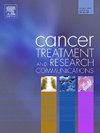Effectiveness of problem-solving skills training on the self-efficacy and self-concept of the adolescent with cancer
IF 2.4
Q3 Medicine
引用次数: 0
Abstract
Objective
Self-efficacy and self-concept can be negatively affected by developmental crises (such as the onset of adolescence) and acquired crises (such as disease). This study aimed to assess the effectiveness of problem-solving skills training on the self-efficacy and self-concept of adolescents diagnosed with cancer.
Methods
This randomized clinical trial involved 60 adolescents with cancer at Dr. Sheikh hospital in Mashhad. The intervention group participated in seven sessions of problem-solving skills training. Adolescents in two groups (intervention = 30 and routine care = 30) completed the Muris self-efficacy questionnaire and Piers-Harris self-concept scale at baseline and one month later.
Results
The findings revealed significant differences in the changes in self-efficacy and self-concept scores between the two groups after the intervention (p < 0.001). The improvement in self-efficacy and self-concept scores in the intervention group was statistically significant.
Conclusion
Problem-solving skills training can enhance self-efficacy and self-concept, thereby improving the mental health of adolescents with cancer by fostering empowerment, increasing positive mood, and enhancing cognitive understanding of their challenges. Nurses can implement this training as a straightforward and cost-effective supportive care strategy for adolescents affected by cancer.
问题解决技能训练对青少年癌症患者自我效能感和自我概念的影响
目的 自我效能感和自我概念会受到发育危机(如青春期开始)和后天危机(如疾病)的负面影响。本研究旨在评估问题解决技能培训对确诊患有癌症的青少年的自我效能感和自我概念的影响。方法本随机临床试验涉及马什哈德谢赫医生医院的 60 名癌症青少年。干预组参加了七个疗程的问题解决技能培训。两组青少年(干预组=30 人,常规护理组=30 人)分别在基线和一个月后完成了 Muris 自我效能感问卷和 Piers-Harris 自我概念量表。结论问题解决技能培训可以提高癌症青少年的自我效能感和自我概念,从而通过增强能力、提高积极情绪和加强对自身挑战的认知理解来改善他们的心理健康。护士可以将这种培训作为一种简单易行、经济有效的支持性护理策略,用于治疗癌症青少年患者。
本文章由计算机程序翻译,如有差异,请以英文原文为准。
求助全文
约1分钟内获得全文
求助全文
来源期刊

Cancer treatment and research communications
Medicine-Oncology
CiteScore
4.30
自引率
0.00%
发文量
148
审稿时长
56 days
期刊介绍:
Cancer Treatment and Research Communications is an international peer-reviewed publication dedicated to providing comprehensive basic, translational, and clinical oncology research. The journal is devoted to articles on detection, diagnosis, prevention, policy, and treatment of cancer and provides a global forum for the nurturing and development of future generations of oncology scientists. Cancer Treatment and Research Communications publishes comprehensive reviews and original studies describing various aspects of basic through clinical research of all tumor types. The journal also accepts clinical studies in oncology, with an emphasis on prospective early phase clinical trials. Specific areas of interest include basic, translational, and clinical research and mechanistic approaches; cancer biology; molecular carcinogenesis; genetics and genomics; stem cell and developmental biology; immunology; molecular and cellular oncology; systems biology; drug sensitivity and resistance; gene and antisense therapy; pathology, markers, and prognostic indicators; chemoprevention strategies; multimodality therapy; cancer policy; and integration of various approaches. Our mission is to be the premier source of relevant information through promoting excellence in research and facilitating the timely translation of that science to health care and clinical practice.
 求助内容:
求助内容: 应助结果提醒方式:
应助结果提醒方式:


